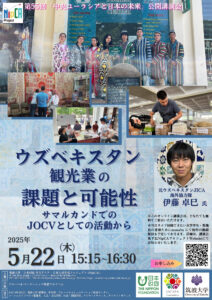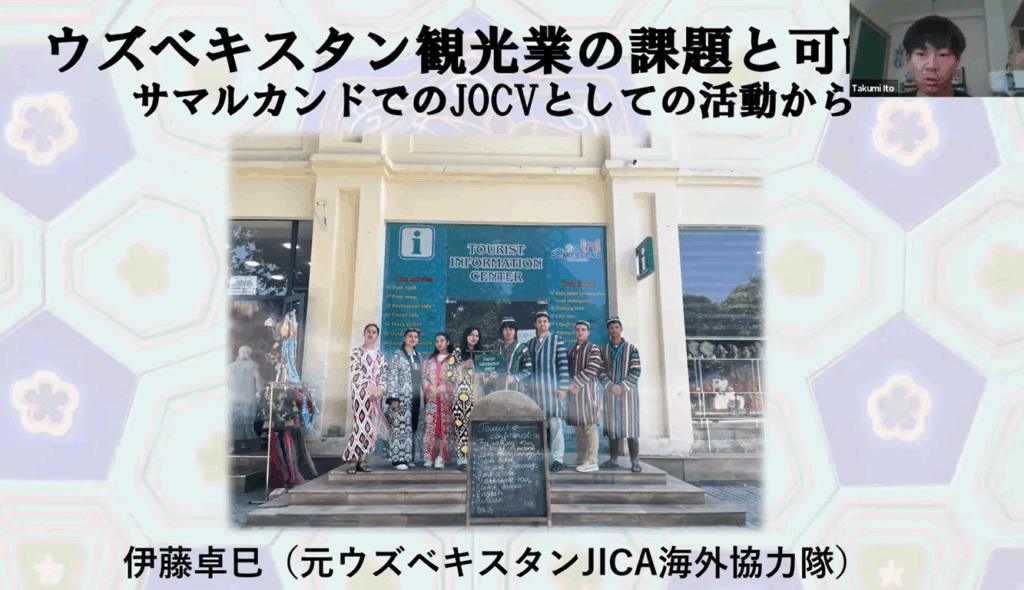On Thursday, May 22, 2025, the 55th public lecture titled “The Future of Central Eurasia and Japan” was held. We invited Mr. Ito Takumi, a former JICA Overseas Cooperation Volunteers in Uzbekistan, to give a lecture titled “Challenges and Opportunities in Uzbekistan’s Tourism Industry: Activities as a JOCV in Samarkand.”
Mr. Ito served as a JICA Overseas Cooperation Volunteer in the tourism sector, based in Samarkand, Uzbekistan, for approximately three years between 2019 and 2024. While promoting tourism in collaboration with local students at a tourist information center, he also gained significant popularity by sharing travel information about Uzbekistan on social media platforms such as X.
In his lecture, Mr. Ito spoke mainly about his observations and insights on tourism in Uzbekistan, the challenges he encountered, and the initiatives he carried out in collaboration with local people. His main base of activities was a tourist information center, where he worked closely with a local manager and students majoring in languages and tourism. He made efforts to provide a welcoming and satisfying experience for visitors, while also creating opportunities for students aspiring to become tour guides to deepen their understanding of their own culture.
One of the key issues Mr. Ito identified through his activities was the lack of information dissemination from the perspective of foreign tourists within the tourism industry. He pointed out that this may be influenced by a cultural characteristic of Uzbekistan—namely, a reliance on auditory communication, such as simply asking someone when in need of information, rather than providing accessible written or visual resources.
Another major issue is the shortage of qualified tour guides. In addition to a decline in the number of aspiring guides, the introduction of a licensing system has reduced opportunities for students to gain hands-on experience in the field. Furthermore, obtaining a license requires attending a certified training school, which entails a high tuition cost. This financial burden was also explained as a significant barrier to the development and retention of tourism personnel.
To address these challenges, Mr. Ito began various initiatives at the tourist information center. In addition to creating and distributing free city maps and bus route guides, he also worked on developing and selling souvenir products tailored to tourists’ needs. Moreover, aiming to provide students aspiring to become tour guides with the opportunity to enjoy interacting with foreign visitors, he organized free tours for foreign travelers. These tours not only offered practical guiding experience but also helped boost the students’ motivation.
To address these challenges, Mr. Ito began various initiatives at the tourist information center. In addition to creating and distributing free city maps and bus route guides, he also worked on developing and selling souvenir products tailored to tourists’ needs. Moreover, aiming to provide students aspiring to become tour guides with the opportunity to enjoy interacting with foreign visitors, he organized free tours for foreign travelers. These tours not only offered practical guiding experience but also helped boost the students’ motivation.
Finally, Mr. Ito spoke about the great potential of Uzbekistan’s tourism industry, citing the country’s friendly and warm national character as well as its diverse tourism resources.
After the lecture, a wide range of questions were raised, including whether Uzbekistan aims to attract foreign tourists, whether the guide industry existed originally, and whether elements related to Islam, which the current administration seeks to promote as a proud tradition of Uzbekistan, are reflected in the tourism sector. This led to a lively Q&A session, and the lecture was concluded successfully.





